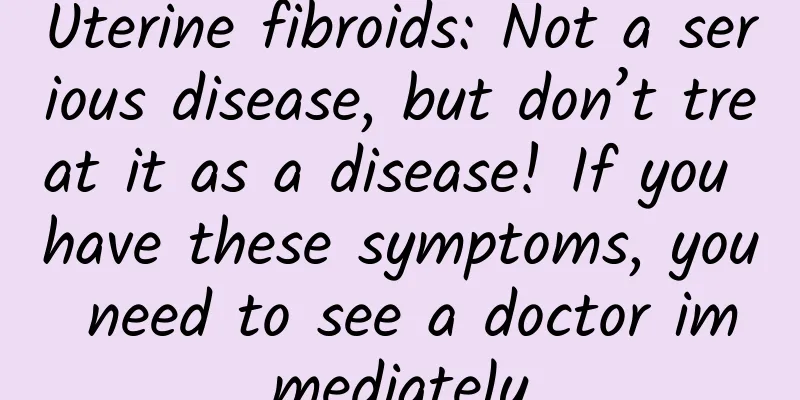Uterine fibroids: Not a serious disease, but don’t treat it as a disease! If you have these symptoms, you need to see a doctor immediately

|
In the field of women's reproductive health, uterine fibroids are a relatively common disease. Many people often feel fear when they hear the word "fibroids", but in fact, uterine fibroids are a common benign gynecological tumor. Although most uterine fibroids do not cause serious health problems, their existence cannot be ignored, and we must not ignore it. 1. What are uterine fibroids? In simple terms, uterine fibroids are a benign tumor formed by the proliferation of uterine smooth muscle cells. It can grow alone or in pairs. It is more common in women aged 30-50. 2. What symptoms will occur? 1. The most typical symptom is menstrual abnormality. Fibroids affect the contraction of the uterus, causing the area of the endometrium to increase, thereby increasing the amount of menstruation. Some patients may even experience a shorter interval between two menstrual periods. 2. If the uterine fibroids are relatively large, the patient may feel a lump in the lower abdomen. This lump is usually hard and movable, and there is no obvious pain after pressing. 3. When the fibroids compress the bladder, another symptom will appear, that is, frequent urination and urgency, which is especially obvious at night; similarly, when the fibroids compress the rectum, the patient will also experience constipation symptoms. 4. Some patients may feel a feeling of heaviness in the lower abdomen, especially during menstruation or after fatigue. If it occurs at the same time as the above symptoms, it is necessary to consider whether uterine fibroids have occurred and go to the hospital for examination. After understanding the symptoms, some people may feel that the symptoms are not that serious. What will happen if they do not take it seriously? First, fibroids will gradually grow larger, compress surrounding organs, aggravate the above symptoms, and may cause secondary anemia over time. More seriously, although uterine fibroids are less likely to become malignant, they may also become malignant if not treated for a long time, leading to malignant diseases such as uterine sarcoma. Therefore, uterine fibroids need to be diagnosed and treated in time to avoid worsening of the condition. 3. Treatment of uterine fibroids Du Yixin, director of the Department of Obstetrics and Gynecology and chief physician of Hunan Provincial Second People's Hospital (Provincial Brain Hospital), reminds everyone that if uterine fibroids are diagnosed, corresponding measures should generally be formulated according to different situations. 1. Observation and follow-up : If the uterine fibroids are small and have no obvious symptoms, the doctor will recommend observation and follow-up. During this process, the patient needs to undergo regular gynecological examinations and ultrasound examinations to observe the growth of the fibroids. 2. Drug treatment : For patients with mild symptoms, doctors will give drug treatment. The purpose of drug treatment is to control the growth of fibroids and relieve symptoms. Commonly used drugs include gonadotropin-releasing hormone agonist (GnRH-a), mifepristone, etc. 3. Surgery : If the uterine fibroids are large, the symptoms are obvious, or if the fibroids are suspected to be malignant, the doctor may recommend surgery. The fibroids or uterus are removed through myomectomy or hysterectomy. The surgery can be performed through different routes such as abdominal, laparoscopic, hysteroscopic or vaginal. 4. There are also a series of treatment options such as ultrasonic HIFU and uterine artery embolization , which require a comprehensive assessment based on each person's specific situation in order to choose a treatment plan that suits the individual. 4. How to prevent the occurrence of uterine fibroids? 1. Eat more vegetables, fruits and other foods rich in vitamins, and eat less spicy and estrogen-rich foods. Eat a balanced diet and eat more protein-rich foods. 2. Pay attention to hygiene during sexual life and menstruation, change underwear frequently, and keep the vulva clean and dry. 3. Maintain a regular work and rest schedule, quit smoking and limit alcohol intake, reduce caffeine intake, exercise appropriately, and enhance physical fitness and resistance. 4. Perform a routine gynecological examination and B-ultrasound examination once a year to observe the condition of the uterus and pelvic cavity. Although uterine fibroids are not a serious disease, they should not be taken lightly. Female friends should understand the relevant knowledge of uterine fibroids, have regular physical examinations, maintain a healthy lifestyle, and prevent the occurrence of uterine fibroids. If uterine fibroids are found, they should seek medical treatment in time and follow the doctor's advice for timely treatment. Let us pay attention to women's health and stay away from the troubles of uterine fibroids. Hunan Medical Chat Special Author: Zhao Qiong, Department of Obstetrics and Gynecology, Hunan Second People's Hospital (Provincial Brain Hospital) Follow @湖南医聊 to get more health science information! (Edited by YT) |
Recommend
What does low antithrombin mean?
Antithrombin 3 is a very important anticoagulant ...
Is it true that breast cancer runs in the family? The truth about genetic screening is...
Common breast cancer genetic-related genes includ...
Can gray hair turn black again? The doctor's answer is unexpected
I believe that not many people like their gray ha...
Principles of treatment for bleeding in the third month of pregnancy
One of the symptoms that pregnant women are prone...
How long after applying latex paint can I open the window? What are the steps for applying latex paint on the wall?
Friends who have never used latex paint may think...
Winter dressing secrets revealed: Turtleneck sweaters may cause health problems
With the coming of winter, warm turtleneck sweate...
Why do you want to defecate during dysmenorrhea?
Dysmenorrhea is a very common phenomenon in norma...
What to eat during breastfeeding to increase milk supply
Exclusive breastfeeding refers to the method of f...
Can I wear light makeup when I'm pregnant?
Many women like to wear makeup at ordinary times....
How to remedy knee pain during confinement
Knee pain during the confinement period is caused...
What to do if you have stomach pain during 7 weeks of pregnancy
For most of us, stomach pain is not a big deal. I...
How to care after cesarean section?
Many women choose cesarean section because they a...
What kind of porridge can be eaten during confinement to help regulate the body?
During the confinement period, a reasonable diet ...
What should I pay attention to when I just got the ring?
IUD insertion is a method of placing a contracept...









